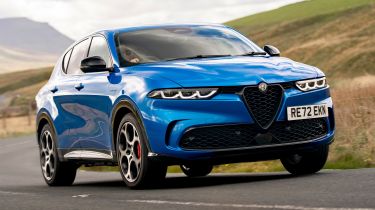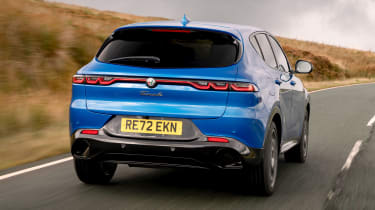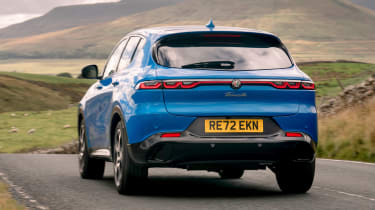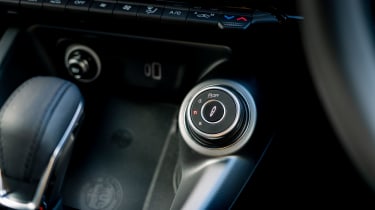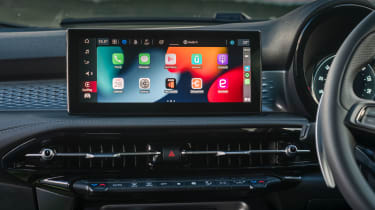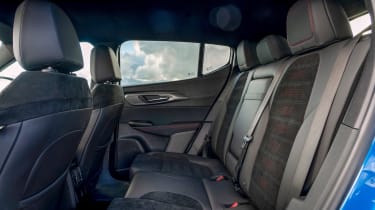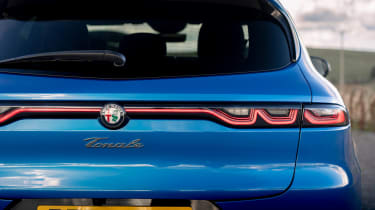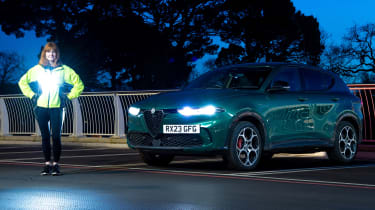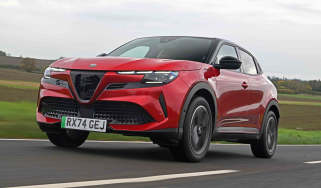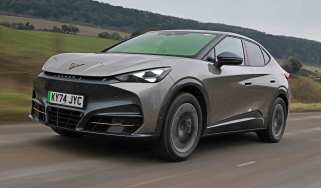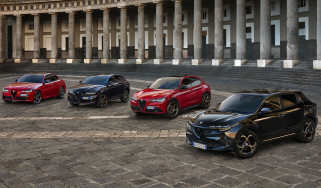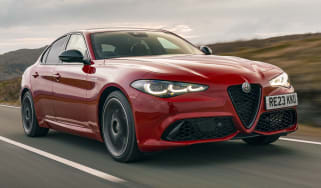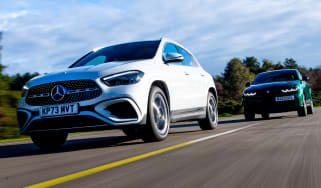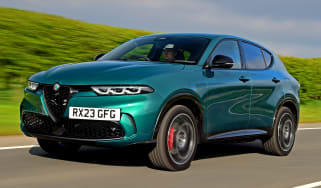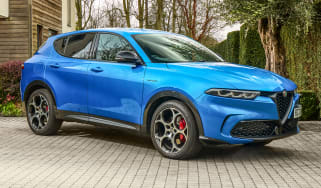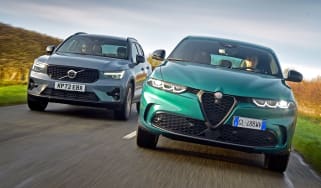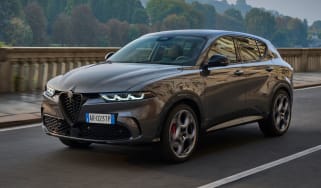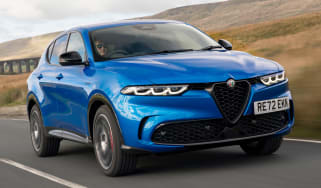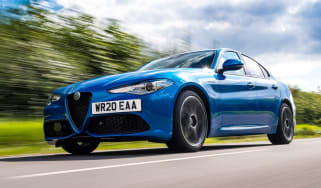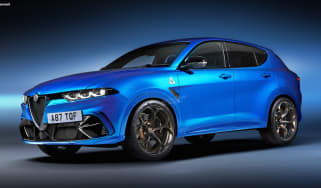Alfa Romeo Tonale review: a pretty but imperfect SUV
Stunning looks, slick tech and decent practicality make the Alfa Romeo Tonale an appealing, if flawed, compact premium SUV

The Alfa Romeo Tonale has its flaws, but it can hold its own against fellow compact premium SUVs from the likes of BMW, Audi and Volvo. It’s a fabulous looking family car for one thing, yet still practical, handles well and features some slick in-car technology. However, the quality of the cabin itself falls short of where it should be considering the price and its competition.
The plug-in hybrid Tonale Q4 is our pick of the range because it’s not only more efficient and offers a competitive 42-mile electric driving range, it’s also better to drive than the mild-hybrid version and packs more punch. For those looking to stand out in the company car park, Alfa’s first plug-in hybrid deserves your attention.
About the Alfa Romeo Tonale
While the Alfa Romeo Guilia saloon and closely related Stelvio SUV breathed some new life into the Italian carmaker, neither quite managed to propel it to new heights. So Alfa Romeo hopes to revitalise itself once again, this time with the Tonale, which heralds “the beginning of a new Alfa Romeo era” – or at least that’s what the Tonale’s website proclaims.
The rear-wheel drive Giorgio platform used by the Guilia and Stelvio is absent here. Instead, under the Tonale’s svelte bodywork are the same underpinnings as the Jeep Compass uses, itself an evolution of the Fiat Small Platform that underpinned the Grande Punto from 2005, and the Alfa Romeo MiTo. Thankfully, the running gear isn’t sourced from the start of the century.
Used - available now

2022 Alfa Romeo
Tonale
11,251 milesAutomaticPetrol1.5L
Cash £22,975
2022 Alfa Romeo
Tonale
11,819 milesAutomaticPetrol1.5L
Cash £22,691
2022 Alfa Romeo
Tonale
9,927 milesAutomaticPetrol1.5L
Cash £22,995The plug-in hybrid Tonale Q4 is the most powerful variant in the range, producing 271bhp all-in and offering all-wheel drive. The 1.3-litre petrol engine under the bonnet sends its power to the front wheels, while the single electric motor fed by a 15.5kWh battery drives the rears.
According to Alfa Romeo, the Tonale Q4 can cover up to 42 miles on electric power alone, or 50 miles if you’re just driving around town. The plug-in Tonale can also return up to 217mpg while emitting 29-32g/km of CO2, which is how it attracts the same eight per cent Benefit-in-Kind tax rate as the latest BMW X1 PHEV, and well below the 14 per cent BiK rate for the equivalent XC40.
Alternatively, you can go for the front-wheel drive, mild-hybrid version of the Tonale. It uses a new four-cylinder 1.5-litre petrol engine paired with a seven-speed dual-clutch transmission and 20bhp electric motor. This combination produces 158bhp in total and allows the car to run on electric power when you start it up, at low speeds and when parking.
Both versions are available in the same three trim levels – Ti, Veloce and Edizione Speciale launch edition – with the upgrade to the plug-in hybrid model adding £6,000 to the Tonale’s price tag. The standard kit list is lengthy, as it should be at this price point, with every model receiving LED headlights, a reversing camera, powered boot lid, keyless entry, 18- to 20-inch alloy wheels, 12.3-inch digital driver’s display and 10.25-inch central touchscreen with Apple CarPlay and Android Auto smartphone connectivity.
Engines, performance and drive
The Alfa Romeo Tonale lives up to its looks on the road. It might use the same basic underpinnings, and some of the same powertrain tech, from the Jeep Compass, but this is not a Jeep in a sharp Italian suit. The Tonale gets a bespoke suspension set-up with frequency-selective dampers that provide a great ride/handling balance that’s satisfying on a twisty road, yet comfortable enough when cruising.
The top-of-the-range Veloce trim adds adaptive dampers that can be controlled independently of the drive modes via a button in the middle of the ‘DNA’ rotary selector, so even if you’re in the sportier Dynamic setting, the bumpy road mode makes the ride noticeably softer.
The latter is a welcome addition as we found the default suspension mode for this set-up a little too firm for the average British B-road and can make the ride a little crashy on more broken-up surfaces, which isn’t particularly confidence-inspiring or comfortable. Plus, even in softer suspension settings, it’s not like the Tonale rolls to a significant degree when cornering quickly.
Sticking with the smaller wheels offered should improve the ride further. We’ve driven models fitted with 18- and 19-inch wheels and found both seem to generate quite a bit of road noise, with some wind noise infiltrating the cabin, too. Like Alfa’s Giulia saloon and Stelvio SUV, the steering is light and fast giving a lively feel on the road.
Alfa Romeo’s familiar ‘DNA’ drive mode selector is present, but it's slightly different here. In Dynamic mode, the throttle, gearbox, stability control and steering are tuned to provide a more direct feel, and in the plug-in hybrid Tonale Q4, the brake regeneration gets stronger, too. Natural is the hybrid mode, which balances between performance and economy, while Advance Efficiency essentially puts the car into EV mode and dulls the throttle to eke out as much range as possible from the battery. There’s also a battery save mode in the plug-in model that lets you reserve charge for later in your journey.
The entry-level Tonale uses a mild-hybrid powertrain that combines a new 1.5-litre petrol engine with a small electric motor, however, the plug-in hybrid Tonale Q4 is our pick of the range. It feels more planted and less likely to be unsettled overall than the mild-hybrid version, and despite the extra weight of the PHEV model, which uses a 1.3-litre petrol engine, electric motor and 15.5kWh battery, it’s still keen to turn in and body control is kept in check.
Straight-line performance is stronger in the plug-in Tonale, too. The torque from the electric motor helps to push the back axle gently when accelerating out of a turn, though the Tonale still feels more front-driven than rear. The electric motor’s 121bhp is plenty for everyday driving and you can drive at up to 84mph on electric power alone in the Tonale PHEV, but it will comfortably cruise along the motorway with the engine just a distant hum at a little over 2,000rpm.
0-62mph acceleration and top speed
With 158bhp and 240Nm of torque on tap in the mild-hybrid Tonale, 0-62mph takes 8.8 seconds while the top speed stands at 131mph.
Performance is modest compared to the plug-in Tonale Q4, but the real let down is the power delivery. There’s a noticeable delay between you pressing the accelerator and the car actually responding. Not only does it suck some of the joy out of blasts along country roads, it’s a pain during regular driving, too, and means you’ll need to wait for bigger gaps when joining a roundabout or overtaking.
Opt for the plug-in hybrid Tonale Q4 with its more powerful petrol engine and electric motor, and power jumps up to 271bhp with over 400Nm of torque. This simultaneously slashes the 0-62mph sprint down to 6.2 seconds. Top speed is slightly lower though at 128mph.
The transition from electric to petrol power can be a bit clunky if you stamp on the throttle to join a motorway or overtake someone, but otherwise it’s pretty smooth and you’re never left floundering because the electric motor gives reasonable shove straight away. The weakest part of this powertrain is the laggy six-speed automatic gearbox.
MPG, CO2 and running costs
The Tonale is Alfa Romeo’s first hybrid, and the first step towards its all-electric future. There are two flavours to choose from: the mild-hybrid model uses a new 1.5-litre petrol engine and a small electric motor that’s fed by a minute 0.8kWh battery.
This combination, according to Alfa Romeo, will return up to 47.9mpg and emit around 135g/km of CO2. Both figures are on par with the stats for a mild-hybrid BMW X1 or Volvo XC40, and allows it to attract a 32% Benefit-in-Kind (BiK) tax rate. That means company car drivers will pay £2,452 a year to run the base Tonale.
But if it’s low running costs you’re after, then the plug-in hybrid Tonale Q4 will be the one for you. Its 1.3-litre petrol engine is paired with a larger electric motor powered by a much larger 15.5kWh battery. As the name suggests, you need to plug this version in to charge the battery, which using a standard 7.4kW home wallbox will take two and a half hours.
CO2 emissions in the plug-in Tonale are much lower at 29-32g/km, while Alfa Romeo says it can return up to 217mpg. If you don’t charge the battery or run it flat on a longer journey you’ll see around 41.5mpg in the plug-in hybrid Tonale, as we experienced first hand when we pitted one against a similarly electrified Volvo XC40 T5 Recharge.
Regular charging will also allow you to cover up to 42 miles on electric power alone, or 50 miles if you’re just driving around town.
One of the big benefits of the Q4’s 40-mile-plus electric-only range is that it allows the Tonale to dip into the eight per cent BiK tax band, compared to the 14 per cent rate the Volvo XC40 Recharge attracts. As a result, a 20% income taxpayer will face annual deductions of close to £700 to run a Tonale Q4, while higher income taxpayers will have to fork over roughly £1,500 a year.
Insurance groups
Sorting out insurance coverage for the Tonale won’t be particularly cheap as even the mild-hybrid Alfa Romeo Tonale lands in insurance groups 28 to 29, while the plug-in hybrid Tonale Q4 sits in groups 37 to 38.
In 2022, our example quote for a Tonale Q4 in Veloce trim, based on a 42-year old male living in Oxfordshire with three penalty points on their licence, came to £626.
Check your tax status and renewal date in seconds. Check your VED car tax now...
Depreciation
Analysts predict that the Alfa Romeo Tonale will retain between 52 and 55 per cent of its value after three years and 36,000 miles come trade-in time. In comparison, both the BMW X1 and Volvo XC40 should hold onto as much as 64 per cent of their original value after the same three-year period, although that depends a lot on the specification you go for.
To get an accurate valuation on a specific model check out our free car valuation tool...
Interior, design and technology
It might be based on a platform that can trace its roots back nearly 20 years to an old Fiat hatchback, but you’d never know it just by looking at the Tonale. It’s a great-looking family car that adds some flair and style to a segment not exactly known for flamboyant design. There are even some references to iconic Alfas of yesteryear, from the SZ in the triple-element light clusters, the 8C with its window line, and (although this one is perhaps a bit of a stretch) the sixties GT’s silhouette.
The interior is fairly minimalist but not quite to the same extent as the latest Volvo cabins, nor does it rely quite so heavily on scratchy piano black plastics as German rivals. There are some new elements like the crisp digital driver’s display and central touchscreen, but the stylish space is enhanced with a few elements lifted directly from the larger Giulia and Stelvio. The most notable is the three-spoke steering wheel and – in the case of the range-topping Veloce model – large metal gear shift paddles mounted to the steering column.
The build quality is typically Alfa, by which we mean there’s a mix of the great and the disappointing. Fortunately, the aspects that fall into the former category tend to be the bits that you touch often, such as the steering wheel and the excellent aluminium shift paddles if you go for the top-spec model. At the same time, the centre console and door trims feel wobbly and are made from scratchy plastic.
Overall, the quality and premium feel of the cabin falls short of where it should be considering the price, or compared to the Tonale’s key rivals like the BMW X1 which excels in those departments.
Sat-nav, stereo and infotainment
The Alfa Romeo Tonale uses the same 10.25-inch central touchscreen as the Maserati MC20 supercar, plus the fully electric Fiat 500 and Jeep Avenger, so we know it’s a solid set-up. The Android-based operating system is easy to navigate, but a lot of the shortcut icons around the edges of the screen are pretty small and not the easiest to hit while on the move. The screen is responsive at least, plus Apple CarPlay and Android Auto feature as standard so you can bypass the built-in infotainment if you’re really not a fan.
The touchscreen isn’t buried in the dashboard like the display in Alfa’s Guilia saloon or Stelvio SUV, instead it sits proudly on top with a set of physical climate controls below – something we always like to see, as it means you don’t have to route around a touchscreen to change the cabin temperature.
Behind the steering wheel is a slick 12.3-inch digital instrument cluster, configurable with three unique looks: a set of modern and sporty dials, a retro set-up designed to look like those in Alfas of old, and a pared-back option that’ll be easy on the eyes at night.
Practicality, comfort and boot space
You’re more likely to pick the Tonale over its key rivals because of the way it drives or looks rather than how practical it is. Cabin space and luggage capacity are decent for a premium compact SUV, just not class-leading. Door bins and the central armrest cubby are a good size, but not quite as large as those in the Volvo XC40, while the smartphone tray is a little awkward because the drive mode dial obstructs it slightly.
Size and dimensions
The Alfa Romeo Tonale measures 4,528mm long, 1,841mm wide, 1,601mm tall and has a wheelbase of 2,636mm. That means it’s longer than either a BMW X1 or Volvo XC40, but is slightly narrower and shorter than either of those direct rivals.
Leg room, head room & passenger space
It’s a bit of a mixed bag in the back of the Tonale. Rear-seat passengers get a decent amount of head and kneeroom, but the seats themselves feel quite flat and the backrests are very upright. What’s more, it’s a little gloomy back there because the rising window line has created fat C-pillars, that also hamper rear visibility.
There is enough space to comfortably seat three passengers at once at least, thanks to the low floor, relatively small hump in the foot well and generous room for feet under the front seats.
Boot
In terms of practicality, the mild-hybrid Tonale’s 500-litre boot is bang in the middle of the class – larger than the 452 litres you get from the Volvo XC40, but not quite matching the BMW X1’s 540-litre boot.
But, as is the case with many plug-in hybrids, the Tonale Q4 gets a significantly smaller 385-litre load area, the most likely culprit being the larger 15.5kWh battery or the additional electric motor on the rear axle. It’s the same story when folding the rear seats down; the mild-hybrid Tonale offers 1,550 litres of cargo space, compared to the plug-in model’s 1,430 litres.
Towing
Both versions of the Tonale are rated to tow up to 700kg of unbraked weight, however the plug-in hybrid version maxes out at 1,250kg compared to the mild-hybrid model which can tow up to 1,500kg if you’ve got a braked trailer. Buyers who prioritise towing ability will be better served by a Volvo XC40 or BMW X1, versions of which can haul up to 2,000kg.
Reliability and safety
The Tonale was awarded the full five-star crash safety rating when it was tested by Euro NCAP in 2022, receiving an 83 per cent score for adult occupant protection and 85 per cent in the child occupant protection category. The Tonale’s 85 per cent for safety assistance technology is no surprise considering every model comes fitted with autonomous emergency braking, traffic-sign recognition, forward-collision warning and adaptive cruise control.
Level two autonomous driving tech is optional, and allows the car to accelerate and steer between lanes for limited periods. A 360-degree camera set-up, blind-spot detection and front parking sensor also come with the level two autonomous driving tech as part of a pack.
We can't say much about the Tonale’s reliability just yet because it's too new and owners haven’t had a proper chance to give their cars a shakedown. The Tonale also didn’t feature in our most recent Driver Power owner satisfaction survey for the same reasons.
Warranty
The Tonale gets a three-year, unlimited mileage factory warranty which will suit most people who decide to lease, but Alfa also offers extended warranties that run in conjunction with any finance deal you might take out. However, the just one year of free roadside recovery you get with the Tonale isn’t so generous. In comparison, Volvo XC40 and BMW X1 customers get three years of free roadside assistance.
Servicing
Alfa offers flexible annual service plans for the Tonale starting from £269. They span from one to five years and include all scheduled maintenance, depending on the term or mileage selected.
Alfa Romeo Tonale Alternatives
The Tonale is a compact premium SUV, which means it's going up against some heavy hitters like the Audi Q3, Mercedes GLA, Volvo XC40 and the new BMW X1. Some less flashy but equally capable alternatives include the Hyundai Tucson and Kia Sportage, while the new MINI Countryman will almost certainly be looking to steal some sales from the baby Alfa, too.
Alfa Romeo Tonale Veloce 1.3 280 PHEV long term test
Our pictures editor, Dawn Grant, has spent six months living with the Alfa Romeo Tonale PHEV as part of our long-term test fleet. Along with its stylish appearance, Dawn has been impressed with the Alfa’s highly effective LED lighting. Elsewhere, most of the on-board features have proved useful and easy to operate, but the powered tailgate has been less than convenient when Dawn has needed to transport her daughter’s dog.
Another area where the Alfa falls short is the automatic gearbox. Dawn says the Tonale was sometimes reluctant to change up at the necessary time, causing the engine to rev excessively. The lane-keeping assist system also failed to detect a set of temporary roadwork markings, nearly causing the car to pull into a set of traffic cones. You can read the full long term test here...

